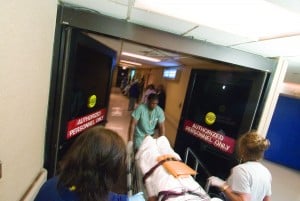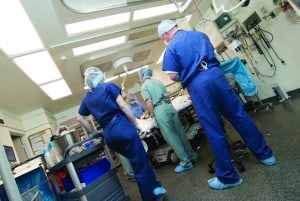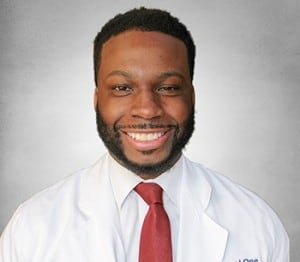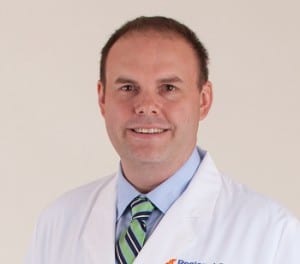It took a spirit of collaboration to improve integration between Regional One Health’s trauma and emergency departments, and the payoff – more efficient patient care and enhanced access to appropriate treatment – is proving well worth the effort.

Employees credit a spirit of collaboration for an effort to better integrate emergency and trauma services at Regional One Health.
Kito Lord, MD, MBA, medical director of Regional One Health’s emergency department; Peter Fischer, MD, trauma and critical care surgeon at the Elvis Presley Trauma Center; and James Richard Walker, MD Emergency Medicine Chair at the University of Tennessee Health Science Center led the effort over the past year and a half.
“We needed to break down walls not just from a physical standpoint, but from a philosophical standpoint. When you peel back the layers, we all want the same thing – the best care for the patient,” Dr. Lord said. “We made multiple changes to be more innovative and collaborative.”
“It was a big collaborative effort,” Dr. Fischer said. “Culturally, it was a difficult thing to do, but it was successful due to that collaboration.”
While challenging, placing the two entities under one umbrella also felt natural.
Regional One Health’s emergency department medical team has the specialized training to handle serious conditions like sepsis, heart attacks, stroke, etc. while also adding value through emergency management skills and the ability to diagnose, stabilize and treat a wide range of patients. Right next door, the trauma center team specializes in caring for the most critical, high-risk patients, like victims of car accidents, gunshots and severe trauma.
The scenarios can, in both cases, be a matter of life or death and emerge unexpectedly. Quick, decisive care is essential.

The collaboration means more efficient care for patients, stellar training for residents and better use of resources.
“We work well together,” Dr. Lord said. “Both disciplines involve personalities that are good under pressure, able to make quick decisions and can handle lots of patients at the same time.”
Several themes stood out as Dr. Lord and Dr. Fischer, working with Critical Care Assessment Nurse Director Charles Lapsley and Nurse Manager Angelita Rodgers, led the effort.
They started by creating synergy between the two staffs, training all emergency department nurses to be trauma credentialed. “Before, the nurses in trauma/critical care assessment and the emergency department never really talked to each other, and now they’re talking all the time and helping each other and learning from each other,” Dr. Lord said. “It’s been huge for patient care and for staff morale.”
Next, they incorporated emergency medicine residents into the trauma residency program. Dr. Fischer said personnel were willing to adjust and work through issues, and the result is better training for everyone: “Regional One Health is an excellent training place for residents from throughout the area,” he said. “A lot of emergency medicine physicians who train here will stay in the area and serve our community, and now they’ll be trained to handle trauma care as well.”
Finally, they worked to improve treatment for intensive care patients as they move through the stepdown process on their way to discharge. The changes led to efficiencies like sharing staff and beds based on real-time capacity.
While each facet is distinct, they resulted in the same crucial outcomes – a more efficient system that does a better job caring for patients and makes it easier for them to get the help they need.
Dr. Fischer noted in the past trauma surgeons received patients who did not necessarily need the most intensive trauma care. Surgeons would evaluate the patient, only to confirm they were unhurt and could be discharged. Now, those patients are instead evaluated by emergency medicine physicians, allowing the trauma surgeons to focus on the most critical patients.

“We all want the same thing – the best care for the patient,” said Dr. Kito Lord, medical director of the emergency department.
“The whole community benefits from having another set of doctors in the emergency department who can take care of patient needs while trauma focuses on the sickest patients,” Dr. Fischer said. “We can continue to be more available to other hospitals and to the patients who need us.”
In the emergency department, meanwhile, the integration allows for 24-hour coverage by an emergency medicine attending physician, so every patient is seen by a board-eligible or board-certified doctor. Time from arrival to seeing a provider dropped by 32 percent, with the average time in the waiting room now 18 minutes (critical patients are seen immediately). The time from when a patient sees a physician to a decision to admit or discharge dropped by about two hours, or 37 percent.

“The whole community benefits…We can continue to be more available to other hospitals and to the patients who need us,” said Dr. Peter Fischer, trauma and critical care surgeon.
This has also impacted trauma diversion – the amount of time the center is at capacity and unable to take new patients. At Regional One Health, it’s been reduced 74 percent since the integration.
Dr. Lord expects improvements to continue, as the trauma and emergency teams meet weekly to discuss patient care and use a shared platform to track metrics, outcomes, etc. Moving forward, they continue to refine the protocols for dealing with specific types of injuries and illnesses to make processes more efficient. Dr. Lord and Dr. Fischer are also working with area emergency medical service providers to continue to improve efficiency.
“We’ve had sustained success,” Dr. Lord said. “Patient care and collaboration have improved – we now know each other by face and name. It’s a good thing for Regional One Health overall.”
“As an institution, Regional One Health should be really proud. It’s something we talked about for a long time, and we finally made it happen – and it’s gone really well,” Dr. Fischer said.
If you would like to support the lifesaving work being done at Regional One Health every day, visit www.regionalonehealth.org/foundation.
